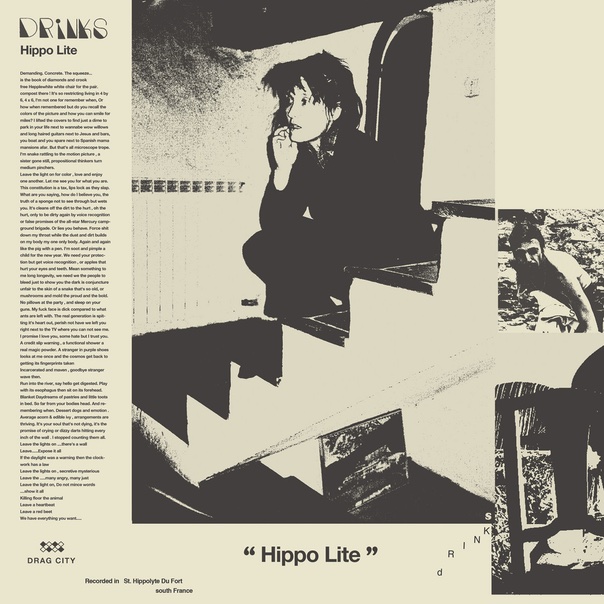ALBUM REVIEW: Cate Le Bon and Tim Presley ferment intimate discord on Hippo Lite as Drinks

When California garage rocker Tim Presley of White Fence joined forces with Welsh singer-songwriter Cate Le Bon, the results subverted everyone’s expectations not only of them but of music in general. Under the moniker Drinks, the duo’s 2015 debut, Hermits On Holiday, flaunted its disdain for convention. Presley’s raw noisiness and Le Bon’s quirky melodic choices found outlandish chemistry, pushing their musicality to limits akin to jazz improvisers. Their followup album, Hippo Lite, continues their pursuit of abnormality, embracing new dimensions of quiet rebellion and charming dissonance.
Hippo Lite
Drinks
April 20
Apparently created in the “dark underbelly” of South France, Hippo Lite revels in its detachment from artistic standards. Singles “Real Outside” and “Corner Shops” emphasize the album’s switch to a skeletal, unplugged sound. Drinks’ intentional disharmony now sounds like they tried to record in a studio apartment without bothering their neighbors. Melodies and lopsided chord values clash over dampened drum-and-bass riffs, as inexplicable violin slides and synth garnishes distort hints of traditional structure almost beyond recognition—not to mention the bizarre singing and lyrics. The results would have become cacophonous in the hands of any other band, but Drinks use methodical minimalism to provide unity in oddity.
Le Bon and Presley prove that an affinity for weirdness hardly deters musicality, as captured by the beautiful opening track “Blue from the Dark.” Easily Hippo Lite’s most digestible song, its finger-picked guitar and earthy piano interlock with dual vocal melodies to a marvelous effect. Creeking strings, processed percussion and a repetitious monotone horn note gradually embellish the harmonious foundation, but every layer remains aesthetically compelling.
Field recordings supplement composited arrangements by illuminating their real purpose. Bird caws and rushing water complement the whimsical guitar noodling of “In The Night Kitchen,” while nonlinear bass drops fit as parts of the puzzle. Appreciating these songs requires listening to how its components interact instead of how they sound on the surface. “Greasing Up” might seem nonsensical with its introductory staccato line hardly fitting into the song’s modulative development, but trusting Drinks’ instincts allows these impressionistic jangles to take hold. However, the impressionistic nature of Hippo Lite causes the album to overstep a few times.
Three interludes spotlight this album’s continuity issues, in that their shortness prevents them from becoming a fleshed-out idea. “IF IT” begins to find its footing in a mystical gloom, but finishes before it starts. Even its longer reprise doesn’t realize the potential of its tip-toeing keyboard melody. The submerged ambiance of “When I Was Young” functions better as connective tissue between “Real Outside” and “Night Kitchen,” but it still feels like the beginning of a song that never actually kicks off. In spite of its setbacks, Hippo Lite’s chain pulling nature works more often than it doesn’t.
“Ducks” exemplifies how idiosyncratic nature can transcend chaos and cross into mad genius, embodying the bustle of urban life with tumbling plunderphonics. Phrases blur together as spontaneous guitar jabs derail the song’s demented take on ragtime, completed by Le Bon’s lackadaisical sing-talking exclamations. It sounds completely insane while retaining palatability in its hushed delivery. The atonal vocal harmonies of “Leave The Lights On” and the sauntering esoterica of “Pink or Die” take Hippo Lite’s eccentricity the farthest. Even these truly baffling passages carry a followable groove, which Drinks implements to an unduplicatable effect.
“This is a broken music. A crumble. It’s the music of the building we called home for a month,” Presley has said about Hippo Lite. The album exists more as a microcosm of the strange circumstances he and Le Bon put themselves in than an attempt to do anything anyone could easily understand. As proven by the haunting conclusion of “You Could Be Better,” these songs impart a one-of-a-kind postcard from an unfathomable mindset. Drinks has completely left behind any notions of orthodoxy, and in doing so created an unforgettable avant-garde experience.
Follow writer Max Heilman at Twitter.com/madmaxx1995.
